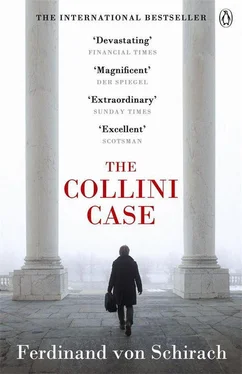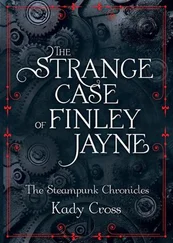‘However, in this case that won’t do,’ Wagenstett explained. ‘We must make the incision elsewhere; we need to find the path of the bullets.’ Latin terms followed, Wagenstett dictated, made an incision from ear to ear, and removed the still-intact scalp. A projectile fell from the jelly-like matter in the exposed wound to the metal table. Two more had lodged in the top of the skull, and a fourth had made its exit through the left eye socket. Wagenstett showed the lumps of metal to Reimers, the senior public prosecutor. ‘Greatly distorted. Ballistics will have a tough time with these,’ the professor said.
Then came the long, thin probes to be used in reconstructing the course taken by the bullets. Wagenstett inserted them in the ‘breaks in the skin’, as he described the entry wounds. They stuck a few centimetres out of the skull. Leinen thought they made the head look like a baroque icon: a saint’s head with rays of light shining from a halo. Wagenstett took photographs, and for some time there was no sound except for the flash charging.
The autopsy went on for another hour; every wound, every haemorrhage, every splintered bone was measured and recorded. There were old scars: on both knees (5 and 8 centimetres), on the right elbow (2 centimetres), a 6-centimetre scar on the belly from an operation to remove the appendix, a 7-millimetre scar above the left elbow, a 9-millimetre scar on the chin. The organs were removed, examined and weighed (brain 1380 g, heart 340 g, right lung 790 g, left lung 630 g, spleen 150 g, liver 1060 g, right kidney 175 g, left kidney 180 g). Blood from the thighs and the heart, urine, stomach contents, liver and lung tissue, and liquid from the gall bladder were assessed. The kicks were described as precisely as possible, and the marks left by the heel of the killer’s shoe were photographed. Wagenstett dictated the findings of the autopsy and the conclusions to be drawn from them. Dr Reimers stood up to stretch his legs. He would get the report next day, he was told, they were overworked in the secretaries’ office. Then Professor Wagenstett stitched the body up again.
The two murder squad officers were the first to leave the autopsy room. Leinen, unable to speak, did not say goodbye to anyone. One of the two police officers was wearing a blue-and-white-striped shirt. Leinen stared at the shirt and began counting the stripes. He saw nothing but the shirt, concentrating on the stripes until he was outside. Then he stood on the flight of steps leading up to the brick building of the Forensic Institute, where he felt the full force of the midday heat. He reached for the silver cigarette case in his jacket pocket. It was cold, and it was real. Hands shaking, he lit a cigarette. Reimers came out to stand beside him, saying something. Leinen couldn’t take it in until he was past the first couple of comments:
‘…the case seems cut and dried. All the shots fired from behind and above. Presumably the first when he was on his knees, the others when he was down on the floor. No sign of any attempt at self-defence, the victim can’t have suspected anything. I’m sorry, Herr Leinen, but it all points to a charge of murder.’ Reimers had taken off his jacket and rolled up his sleeves. There were dark marks on his shirt collar. ‘My God, it’s hot,’ he said.
‘Yes,’ said Leinen. His mouth was dry, his tongue furred.
‘Have a word with your client; maybe he’ll say why he did it after all. That’s usually the best course to take in a situation like this.’
‘I’ll do that. Thanks.’
Leinen went to his car, only to find it boxed in by a delivery van. He sat down in the shade on the warm slate slabs of a gateway entrance. It was quiet here. The pollen of a chestnut tree had dusted the pavement and the strip of grass red; light was refracted on the hot tarmac, making the street mirror the sky like a stretch of water. I can simply take the plate off my office door again and forget all about this, thought Leinen.
At five in the afternoon Leinen rang the doorbell of Mattinger’s chambers. Reception for visitors was in the Berlin Room, as it was called, a large room with only one window. It linked the façade to the lateral wings and the back of the building. One of the secretaries told Leinen to go straight through; Herr Mattinger was expecting him. Leinen knocked at his door, waited, heard nothing and went in.
The room was dark, not much larger than Leinen’s own office, with a simple desk, a wooden chair with arms at the desk, no visitors’ chairs, a yellow lamp, a black phone with a circular dial. The walls were panelled in mahogany, bookshelves were built into the side walls, and there were broad wooden venetian blinds over both windows. It looked like an office from the 1920s. A large cigar box stood on the desk, black wood with pale intarsia work. Mattinger had his feet up on the desk and was dozing; his tie had slipped, saliva trickled from the right-hand corner of his mouth. A few red files lay in front of him; Leinen could see from the names on them that they were being dealt with by other lawyers in the chambers. Mattinger woke with a jolt, saw Leinen, wiped his mouth and stood up. ‘How are you, Herr Leinen?’ he asked. He didn’t reek of alcohol, but the sweetish odour of a man who habitually drinks too much clung to him. ‘You look tired.’
‘Thanks, you’re the third person to say so today.’
‘Then it’s probably true. Come along, we’ll be too cramped in here. Let’s sit on the balcony.’
‘I like your room.’
‘I bought it thirty years ago from a building on the Kurfürstendamm that was being renovated, had it installed here. It’s said to have belonged to a famous notary.’
‘It’s wonderful.’
‘Maybe a little too dark,’ said Mattinger. ‘But I’m used to that by now.’
They went through two large conference rooms to the balcony, where they sat on pale rattan outdoor furniture under an awning. It had been raining; steam rose from the street.
Mattinger went back into one of the conference rooms. Leinen heard him speaking to the secretaries in their office, ordering drinks. When he came back he took a cigar case out of his jacket, a well-worn leather case. In his pinstriped suit, Mattinger himself looked like someone from the 1920s.
‘Do you smoke cigars? No? What a pity.’ He took a cigar cutter from his waistcoat pocket, twisted it slowly in the end of the cigar and drew out the remains of tobacco with it. Using an extra-long match, he lit the cigar. Although he had to do everything with one hand, he made it look easy. ‘I’ve been making inquiries about you, Leinen.’
‘Really?’
‘Distinction in both your state examinations, best of your year in criminal law, assistant to the professor of criminology at Humboldt University, fifteen publications in legal journals.’ Mattinger drew on his cigar. ‘I’ve read them all. Some of them are really first class.’
‘Thank you.’
‘You had offers that would have allowed you to stay on at the university or be appointed a judge. You turned both down. You wanted to be a practising lawyer. Your professor considers that you have a brilliant mind, but he also described you as obstinate and pig-headed.’ Mattinger laughed.
Leinen laughed with him, but he felt uncomfortable. ‘He’d say a thing like that to you?’
‘Your professor and I have known each other for a hundred years. I like to know what sort of person I’m dealing with.’
The secretary brought coffee and water. They talked about judges and public prosecutors. Meanwhile Leinen watched Mattinger blowing cigar smoke into the air. Gradually he relaxed.
‘Well, what have you decided, Leinen? Are you going to defend Collini?’
‘I’m not sure yet. I’ve just been at the autopsy. It was grisly.’
Читать дальше












